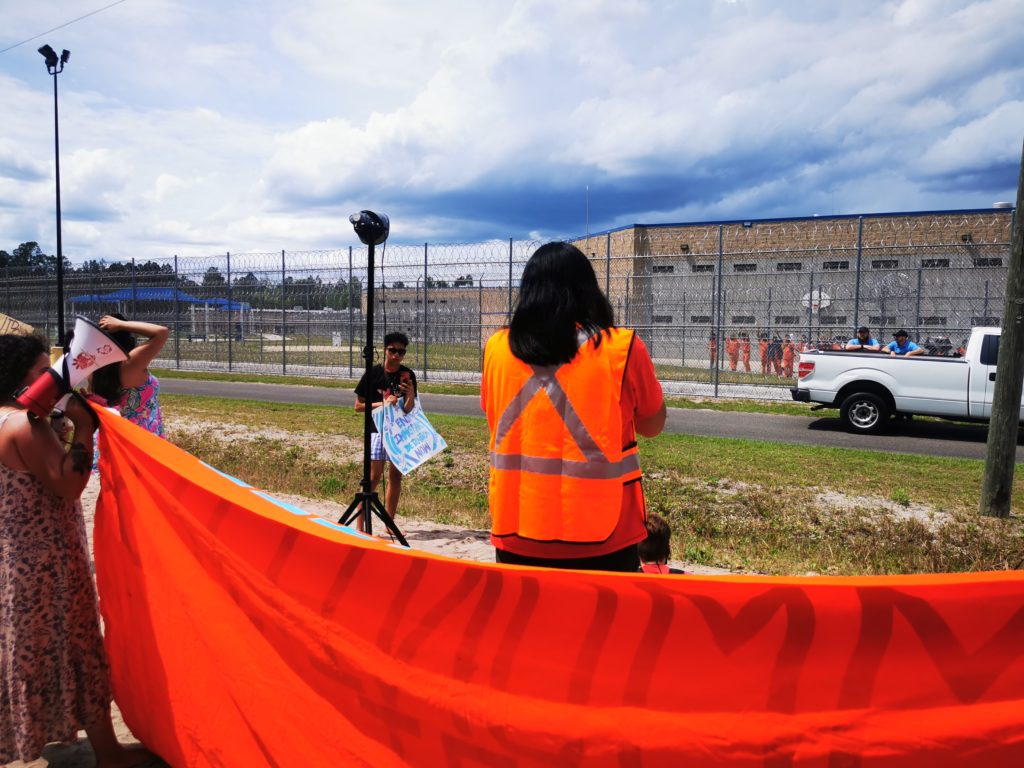Immigrants incarcerated at the Folkston ICE Processing Center launched a hunger strike after a protest was held in front of the prison on April 16. There is currently a campaign against plans to drastically expand FIPC which, if it were to happen, would make it the largest prison for immigrants in the country.
In a press statement released by the Campaign to Shut Down FIPC, campaign organizer, Nat Villasana, explained, “This hunger strike is being carried out to protest abuse, human rights violations, excessive delays in legal proceedings and retaliation many are facing for speaking out about their conditions.”
The strike began on April 18 after inmates were placed in solitary confinement for staying in the yard to chant and speak with the protesters through the fences during the April 16 protest. Following this the entire B4 Unit refused to eat, kicking off the hunger strike.
The immigrants who were placed in solitary confinement face dehumanizing conditions. In the press release Villasana explained, “We have been told that while in isolation, they are only served one meal a day, spoiled milk is the only thing provided for breakfast, and they are only let out once a day for time to shower.”
The hunger strike is viewed as an urgent situation by the campaign which is calling on all people to support the prisoners. You can sign the petition to shut down FIPC here.
More protests are currently being planned to support the hunger strike.
April 16 protest in front of FIPC
The April 16 protest was called by the Campaign to Shut Down FIPC with support from Community Estrella, ICE Breakers, Migrant Equity, CASA, Somos South GA, Asian Americans Advancing Justice, the Party for Socialism and Liberation and others.
As the protest began, the cries of inmates could be heard in the distance: “El pueblo, unido, jamas sera vencido!” (In English, “The people, united, will never be defeated.”) Within minutes the road in front of FIPC was filled with a roaring of chants. The inmates’ voices rang louder than the protesters as they clung to the chain-link fence topped with barbed wired.
Inmates began shouting out to the protesters about the inhumane conditions of the prisons. “I haven’t seen my family,” one person yelled. “They are locking us in solitary confinement!” yelled another. Nilson Barahona, an organizer for ICE Breakers, began a fiery speech addressing protesters and the inmates. They chanted back at him and called out to him about their own stories. Nilson retold the words of one man, “They told me if people showed signs of suicidal thoughts the psychiatrist would send them to solitary. Once in solitary they would take away all their belongings like shoes.”

During the protests activists began a roll call of different Central and South American countries to raise the morale of the inmates. With hoarse voices, they chanted: “Honduras! Guatemala! Mexico! Cuba…” Eventually “Haiti” was chanted out and in response the crowd of immigrants stirred and began pointing to the entrance of the building. Campaign organizer Ariel Prado explained, “They are saying the Haitians have been placed in solitary confinement!” This fact speaks volumes about the system of racist mass incarceration and reminded protesters of the images of the whipping of Haitian migrants from last year.
The protest demands included the “Complete shutdown of FIPC, campaign organizers are demanding full rights for all immigrants, an end to mass incarceration, and a stop to U.S. imperialist exploitation—the preceding cause of migration and refugee crises.”
These immigrants from central and south Americas face a two-sided attack: Dealing with the U.S. imperialist destabilization abroad and its system of mass incarceration when they flee for safety. Only by changing the system and bringing an end to imperialism will people know peace.
As the sun continued to beam high above and voices of the inmates and activists grew hoarse, the protest came to an end, but not without a promise made between these two groups. As the protesters walked home with their fists held high they said in solidarity, “We will see you soon.”





